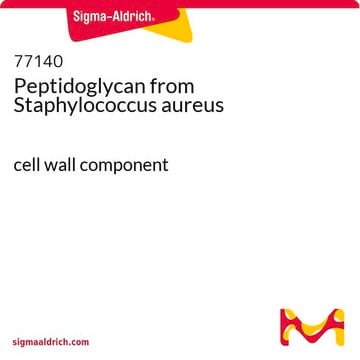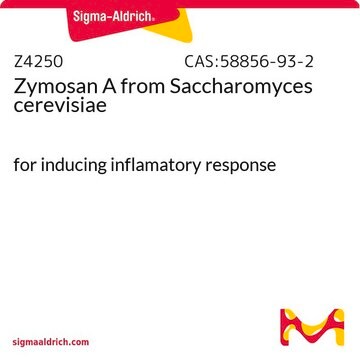506350
Pam₃Cys-Ser-(Lys)₄, Hydrochloride
≥90% (HPLC), lyophilized solid, TLR1/TLR2 agonist, Calbiochem®
Synonym(s):
Pam₃Cys-Ser-(Lys)₄, Hydrochloride, (S)-[2,3-Bis(palmitoyloxy)-(2-RS)-propyl]-N-palmitoyl-(R)-Cys-(S)-Ser-(S)-Lys₄-OH, 3HCl, P₃CSK₄, 3HCl, Pam₃Cys-SK₄, 3HCl, Pam3CSK4, TLR1/TLR2 Agonist I
About This Item
Recommended Products
product name
Pam₃Cys-Ser-(Lys)₄, Hydrochloride,
Assay
≥90% (HPLC)
Quality Level
form
lyophilized solid
manufacturer/tradename
Calbiochem®
storage condition
OK to freeze
desiccated
solubility
water: 2 mg/mL
shipped in
wet ice
storage temp.
−20°C
InChI
1S/C81H156N10O13S/c1-4-7-10-13-16-19-22-25-28-31-34-37-40-55-73(93)86-72(65-105-64-66(104-75(95)57-42-39-36-33-30-27-24-21-18-15-12-9-6-3)63-103-74(94)56-41-38-35-32-29-26-23-20-17-14-11-8-5-2)80(100)91-71(62-92)79(99)89-68(52-44-48-59-83)77(97)87-67(51-43-47-58-82)76(96)88-69(53-45-49-60-84)78(98)90-70(81(101)102)54-46-50-61-85/h66-72,92H,4-65,82-85H2,1-3H3,(H,86,93)(H,87,97)(H,88,96)(H,89,99)(H,90,98)(H,91,100)(H,101,102)/t66?,67-,68-,69-,70-,71-,72-/m0/s1
InChI key
OEDPHAKKZGDBEV-GFPBKZJXSA-N
General description
Application
Warning
Reconstitution
Other Notes
Zahringer, U., et al. 2008. Immunology.213, 205.
Toshchakov, V., et al. 2002. Nat. Immunol.3, 392.
Muller, M.R., et al. 2001. Immunology103, 49.
Vergne, I., and Cezanne, L. 1999. Eur. J. Biochem.264, 369.
Diaz-Guerra, M.J., et al. 1996. J. Biol. Chem.271, 30114.
Offermanns, S., et al. 1992. Biochem. J.282, 551.
Seifert, R., et al. 1990. Biochem. J.267, 795.
Hoffmann, P., et al. 1989. Biol. Chem. Hoppe. Seyler.370, 575.
Legal Information
Storage Class Code
11 - Combustible Solids
WGK
WGK 1
Flash Point(F)
Not applicable
Flash Point(C)
Not applicable
Certificates of Analysis (COA)
Search for Certificates of Analysis (COA) by entering the products Lot/Batch Number. Lot and Batch Numbers can be found on a product’s label following the words ‘Lot’ or ‘Batch’.
Already Own This Product?
Find documentation for the products that you have recently purchased in the Document Library.
Customers Also Viewed
Our team of scientists has experience in all areas of research including Life Science, Material Science, Chemical Synthesis, Chromatography, Analytical and many others.
Contact Technical Service







